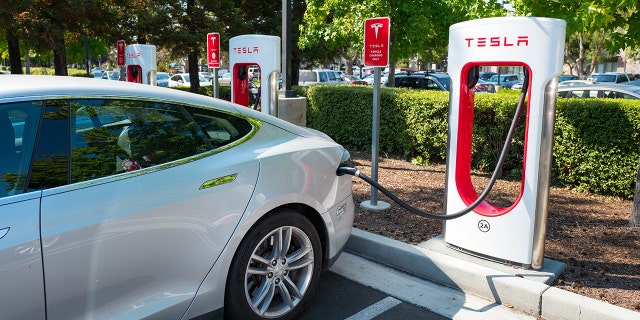A new report published by the Manhattan Institute threw cold water on the purported climate and cost benefits of electric vehicles (EVs) widely touted by lawmakers and automakers.
Overall, the rapid electrification of the U.S. transportation sector would increase consumer costs, make the electric grid more vulnerable to blackouts, threaten national security and may not even lead to fewer greenhouse gas emissions, according to the paper titled “Electric Vehicles for Everyone? The Impossible Dream” and authored by Manhattan Institute senior fellow Mark Mills.
“I think it’s morally consequential. It’s geopolitically consequential and socially, economically consequential,” Mills told Fox News Digital in an interview. “The subsidies and the mandates run the risk of causing maybe the biggest misallocation of capital in modern times in the industrial markets. Hundreds of billions of dollars are going to be spent chasing these mandates, requirements.”
“And it won’t, as the report shows, it won’t achieve the goals intended and the attempt to do so will have enormous economic and social costs because the underlying premises are either incorrect, too poorly understood or too difficult to quantify in order to take the actions that are being taken,” he continued.
EXPERTS SLAM PETE BUTTIGIEG’S COMMENTS ON EVS: ‘A CON JOB’
President Joe Biden makes his entrance at the General Motors’ Factory ZERO electric vehicle assembly plant in Detroit, Michigan, on Nov. 17, 2021 (Nic Antaya/Getty Images)
Mills said the government push to aggressively electrify the transportation sector over the coming years is based on the premises that it will both help the environment by lowering economy-wide carbon emissions and help save consumers money through lower fueling costs while keeping car prices co-equal with current prices.
However, Mills’ report highlights that emissions and costs are subject a wide range of conditions.
MORE THAN 150 REPUBLICANS UNITE TO CONDEMN BIDEN’S ‘ILL-CONSIDERED’ ELECTRIC VEHICLE PUSH
“It depends on when and where you charge the vehicle,” he told Fox News Digital. “Then you have to add to that, the emissions that occur before you get the vehicle in your driveway for the first time because all vehicles entail CO2 emissions associated with the energy you use to build the vehicle. You use of materials and machines to build everything.”
“For an internal combustion engine, something on the order of 15 to 20% of the emissions that is associated with the vehicle over its lifetime of operating occur before you drive it,” he continued. “With an electric vehicle, the share of emissions range from 15% to 100% of total lifecycle emissions. And they’re far greater than the conventional vehicle because you’re building a fuel tank, a battery, on difficult-to-acquire metals.”
Mills added that there are “realistic scenarios” where driving an electric vehicle will cause greater global emissions than driving an internal combustion engine.
His report, meanwhile, comes as lawmakers at the federal and state level continue to take aim at traditional gas-powered vehicles while boosting EVs.

According to Manhattan Institute senior fellow Mark Mills, electric vehicles could have a larger carbon footprint than traditional gas-powered cars. (Smith Collection/Gado/Getty Images)
In December, the Environmental Protection Agency (EPA) finalized rules targeting heavy-duty trucks that it said at the time were the “strongest-ever national clean air standards to cut smog- and soot-forming emissions” from such vehicles. The new standards went into effect on March 27 and will be implemented for new trucks sold after 2027.
Then, in April, the EPA proposed the most aggressive federal tailpipe emissions targeting light- and medium-duty emissions ever crafted. If finalized and implemented, a staggering 67% of new sedan, crossover, SUV and light truck; up to 50% of bus and garbage truck; 35% of short-haul freight tractor; and 25% of long-haul freight tractor purchases could be electric by 2032, the White House projected.
The EPA also reinstated in March 2022 California’s authority under the Clean Air Act to implement its own emission standards and electric vehicle sales mandates, allowing other states to also adopt California’s rules.

California Gov. Gavin Newsom is seen at Moffett Federal Airfield before President Biden’s arrival in Mountain View, California, on June 19. (Tayfun Coskun/Anadolu Agency via Getty Images)
Months later, in August, the California Air Resources Board, a leading state environmental agency, approved regulations mandating that all car purchases in the state — which leads the country in annual car sales — are zero emissions by 2035. Overall, it is estimated that the nearly 20 states set to adopt California’s regulations represent more than 40% of total U.S. car purchases.
CLICK HERE TO GET THE FOX NEWS APP
“Ultimately, if implemented, bans on conventionally powered vehicles will lead to draconian impediments to affordable and convenient driving and a massive misallocation of capital in the world’s $4 trillion automotive industry,” Mills wrote in his report.
“Imagining a hypothetical all-EV world requires acknowledging the unavoidable fact of a rats’ nest of assumptions, guesses, and ambiguities regarding emissions,” he concluded. “Much of the necessary data may never be collectible in any normal regulatory fashion, given the technical uncertainties and the variety and opacity of geographic factors, as well as the proprietary nature of many of the processes.”
“Those uncertainties could lead to havoc if U.S. and European regulators enshrine ‘green disclosures’ in legally binding ways, and it all will be subject to manipulation, if not fraud.”